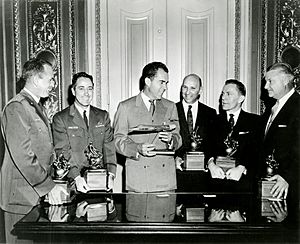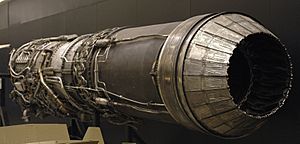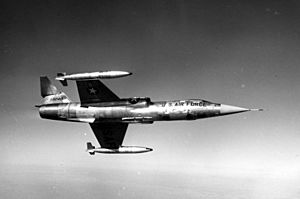Neil Burgess Jr. facts for kids
Quick facts for kids
Neil Burgess Jr.
|
|
|---|---|

1958 Collier Trophy with (left to right) Walter W. Irwin, Howard C. Johnson, USA VP Nixon, Gerhard Neumann, Neil Burgess, Clarence Leonard "Kelly" Johnson
|
|
| Born | August 2, 1918 |
| Died | April 20, 1997 (aged 78) |
| Nationality | American |
| Education | M.S. electrical engineering (1939) |
| Alma mater | Massachusetts Institute of Technology |
| Occupation | Aircraft engineer and innovator |
| Employer | General Electric |
| Known for | General Electric J79 |
| Spouse(s) | Evelyn Ruth Lent (1922-2000) |
| Children | Cynthia Mark Neil Burgess Susan Nancy (1944-2008) Wendy (1957-) |
| Parent(s) | Roy Neil Burgess (1875-1950) Lucia L. Payne (1870-1937) |
| Awards | Collier Trophy (1958) GE Aircraft Engines Hall of Fame |
Neil Burgess Jr. (born August 2, 1918 – died April 20, 1997) was a brilliant American engineer. He was a leader in designing powerful engines for airplanes.
He worked at General Electric and helped create amazing jet engines. With Gerhard Neumann, he won a big award called the Collier Trophy in 1958. This was for their work on the General Electric J79 jet engine, which powered the super-fast Lockheed F-104 Starfighter plane.
About Neil Burgess Jr.
Neil Burgess Jr. was born on August 2, 1918, in Melrose, Massachusetts. He started working for General Electric in the 1930s.
He studied at the Massachusetts Institute of Technology (MIT) and earned a master's degree in electrical engineering in 1939. In 1943, he married Evelyn Ruth Lent. They had five children: Cynthia, Mark Neil, Susan, Nancy, and Wendy.
Neil Burgess Jr. worked for General Electric for almost 50 years. He retired in 1983 as a vice president. He passed away on April 20, 1997, in Cincinnati, Ohio.
The J79 Jet Engine
The J79 was a very important jet engine. It was built at the same time as the F-104 plane. The J79 was the first engine to fly faster than Mach 2. This means it could go twice the speed of sound!
Neil Burgess and Gerhard Neumann solved big problems with this engine. They made it accelerate quickly without stopping the airflow, which is called a "compressor stall." They also made it reliable and use less fuel at different speeds.
They invented a special "variable stator" system. This system helped control the air flowing into the engine. It worked so well that engineers at first didn't believe the test results! The J79 started test runs in 1954. It first flew on the F-104 plane in 1956. This engine helped the F-104 reach Mach 1.1 normally and Mach 2.2 using its afterburner.
Winning the Collier Trophy
The Collier Trophy is a very important award in aviation. It is given for great achievements in flight. In 1958, it was awarded to a team of people and companies.
This team included the U.S. Air Force, Clarence "Kelly" Johnson from Lockheed Skunk Works (who designed the F-104 plane), and Neil Burgess and Gerhard Neumann from General Electric (who designed the J79 engine).
Two pilots, Major Howard C. Johnson and Captain Walter W. Irwin, also received the award. They used the F-104 with the J79 engine to set new world records. Major Johnson set a world altitude record, flying to 91,243 feet. Captain Irwin set a world speed record, flying at 1,404.09 miles per hour!
 | William L. Dawson |
 | W. E. B. Du Bois |
 | Harry Belafonte |



